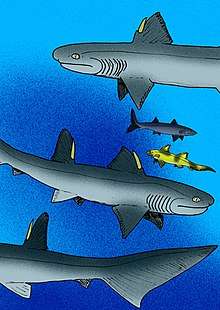Kaibabvenator
Kaibabvenator swiftae is a very large, extinct ctenacanthiform shark that lived in marine environments in what is now Arizona, during the Middle Permian Period. K. swiftae is known from large teeth up to 30 millimeters long found in the Kachina Microsite, of the lower Fossil Mountain Member, in the Kaibab Formation near Flagstaff, Arizona.[1] The specific name honors researcher Sandra Swift for her paleontological contributions to Northern Arizona University.[1]
| Kaibabvenator Temporal range: Late Leonardian | |
|---|---|
 | |
| Comparison of K. swiftae, Diablodontus, and Glikmanius | |
| Scientific classification | |
| Kingdom: | |
| Phylum: | |
| Subphylum: | |
| Infraphylum: | |
| Class: | |
| Subclass: | |
| Order: | Ctenacanthiformes |
| Family: | |
| Genus: | Kaibabvenator Hodnett, Elliot, Olson & Wittke, 2012[1] |
| Species: | K. swiftae |
| Binomial name | |
| Kaibabvenator swiftae | |
References
- Hodnett, John-Paul M.; Elliott, David K.; Olson, Tom J.; Wittke, James H. (2012). "Ctenacanthiform sharks from the Permian Kaibab Formation, northern Arizona". Historical Biology. 24 (4): 381. doi:10.1080/08912963.2012.683193.
This article is issued from Wikipedia. The text is licensed under Creative Commons - Attribution - Sharealike. Additional terms may apply for the media files.